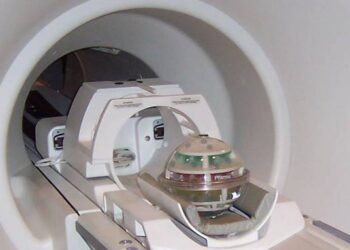Early feeding practices modifiable through appropriate education
Image: PD
1. Maternal feeding practices were effectively modified by educational intervention.
2. The intervention did not produce significant differences in anthropometric indicators of obesity between groups at 2 years of age; further follow-up will be conducted at 3.5 and 5 years old.
Evidence Rating Level: 1 (Excellent)
Study Rundown: As the prevalence of obesity steadily rises, researchers continue to look for new ways to prevent childhood obesity. In this early presenting of findings from the NOURISH RCT, researchers investigated the potential to confer resilience against childhood obesity through maternal education on protective, early feeding practices. Participants were randomized into intervention and control groups, with the intervention group receiving training modules focused on healthy eating practices. Questionnaires were used to assess the change in feeding practices. Weight and height measurements were gathered initially and then at follow-up when the child was 2 years old. At the conclusion of the study, significant differences were seen in reported feeding practices between the intervention and control groups. However, no significant difference in anthropometric data between the groups was observed. Limitations include possible response bias in connection with self-completed questionnaires. This study indicated that maternal education regarding eating habits may make substantial contributions to the development of healthier feeding practices among families. Additional follow-up will be necessary to determine if this intervention is effective at preventing excessive weight gain among children.
Click to read the study, published today in Pediatrics
Relevant Reading: Effectiveness of home based early intervention on children’s BMI at age 2
Study Author, Dr. Kimberley Mallan, PhD, talks to 2 Minute Medicine: Queensland University of Technology
“The need to prevent childhood obesity is clear but the key questions are when and how. How parents feed their children ‘programs’ their taste preferences, texture tolerance and appetite regulation. These early feeding practices lay the foundation for life-long healthy eating habits. The NOURISH randomised controlled trial evaluated whether an intervention to equip parents with the confidence and skills to initiate and maintain positive feeding practices in infancy and toddlerhood can foster children’s healthy food preferences, dietary intake, eating patterns and growth. This paper reports the outcomes on maternal feeding practices and child growth at two years of age. Intervention effects on mothers’ use of protective feeding practices clearly indicate that child feeding practices are modifiable. The 4.1% point reduction in prevalence of overweight/obesity at 2 years was not statistically significant but translated to population level would represent an important reduction in prevalence and longer term obesity risk.”
In-Depth [randomized controlled trial study]: A total of 698 participants were randomized into intervention and control groups. The intervention group received healthy food preference instruction (module 1) and education promoting self-regulation of energy intake to need (module 2). They also received training involving positive parenting (warmth, encouragement of autonomy, and self-efficacy). Control groups had standard access to child health services which included child weighing at the mothers’ request. Responses from questionnaires were used to assess maternal feeding constructs. There were significant differences in questionnaire responses on follow-up, indicating a modification in maternal feeding practices for the intervention group. Intervention mothers used healthy (responsive) feeding practices more often than non-responsive (p values, .033 to <.001). No significant differences in weight, height, or BMI were seen at 2-year-old follow-up. This study displays the results obtained when participants were 2 years of age; additional follow-ups will be completed at 3.5 and 5 years to reassess feeding practices and anthropomorphic measures.
By Brandon Childs and Leah H. Carr
More from this author: Otoacoustic emissions may be an effective objective hearing test, Early weight gain linked to obesity and cardiovascular health, Influenza vaccine safe for IBD patients, Incidence of pediatric melanoma is increasing, X-ray after foreign body removal by esophagoscopy is not cost effective, Procalcitonin levels linked with acute pyelonephritis
© 2013 2minutemedicine.com. All rights reserved. No works may be reproduced without written consent from 2minutemedicine.com. Disclaimer: We present factual information directly from peer reviewed medical journals. No post should be construed as medical advice and is not intended as such by the authors or by 2minutemedicine.com. PLEASE SEE A HEALTHCARE PROVIDER IN YOUR AREA IF YOU SEEK MEDICAL ADVICE OF ANY SORT. Content is produced in accordance with fair use copyrights solely and strictly for the purpose of teaching, news and criticism. No benefit, monetary or otherwise, is realized by any participants or the owner of this domain.








